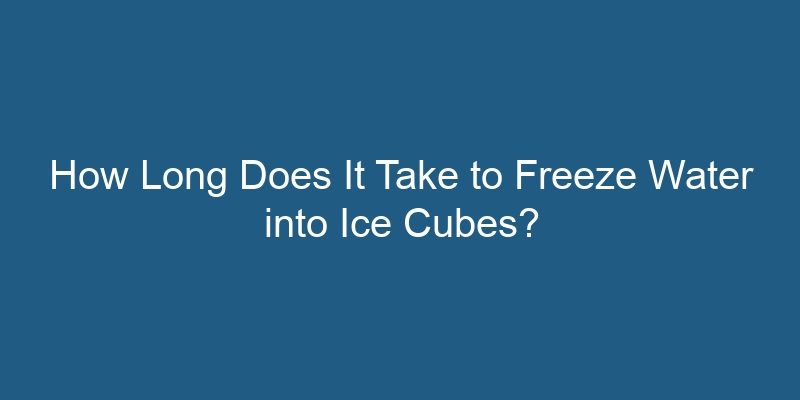Freezing water into ice cubes is a common household task that many of us perform regularly. Whether it’s for cooling beverages or preserving food, ice cubes are a convenient and practical solution. However, have you ever wondered how long it takes for water to freeze into ice cubes? In this article, we will explore the factors that influence the freezing process and provide you with a detailed understanding of the time required to freeze water into ice cubes.
- The Science of Freezing
- 1. Temperature of the Freezer
- Factors Influencing Freezing Time:
- How Long For Water To Freeze
- 2. Volume of Water
- Factors Influencing Freezing Time:
- 3. Container Material
- Factors Influencing Freezing Time:
- 4. Water Purity
- Factors Influencing Freezing Time:
- 5. Agitation and Stirring
- Factors Influencing Freezing Time:
- Conclusion
The Science of Freezing
Before delving into the specifics of freezing water into ice cubes, it’s important to understand the science behind the freezing process. Freezing is the phase transition of a substance from a liquid to a solid state due to the removal of heat energy. When water reaches its freezing point, the molecules slow down and arrange themselves into a rigid crystalline structure, forming ice.
Now, let’s explore the various factors that affect the freezing time of water.
1. Temperature of the Freezer
The temperature of the freezer plays a crucial role in determining how quickly water freezes into ice cubes. Most household freezers operate at temperatures between -15°C to -20°C (5°F to -4°F). At these temperatures, water freezes relatively quickly, typically within 1 to 2 hours. However, it’s important to note that the exact freezing time may vary depending on other factors.
Factors Influencing Freezing Time:
1.1. Temperature Setting: The lower the temperature setting of your freezer, the faster water will freeze. Setting the freezer at its lowest possible temperature can significantly reduce freezing time.
1.2. Air Circulation: Proper air circulation within the freezer ensures uniform cooling and faster freezing. Make sure to avoid overcrowding the freezer, as it can hinder air circulation and increase freezing time.
How Long For Water To Freeze
2. Volume of Water
The volume of water being frozen is another important factor that affects freezing time. The larger the volume, the longer it will take for the water to freeze into ice cubes. This is due to the increased amount of heat energy that needs to be removed to reach the freezing point.
Factors Influencing Freezing Time:
2.1. Ice Cube Tray Size: The size and shape of the ice cube tray determine the volume of water being frozen. Smaller ice cube trays with smaller compartments will freeze water faster compared to larger trays with larger compartments.
2.2. Water Level: The depth of water in the ice cube tray also affects freezing time. Shallower water freezes faster than deeper water, as the surface area exposed to the cold air is greater.
3. Container Material
The material of the container or ice cube tray used to freeze water can impact freezing time. Different materials have varying thermal properties, which affect the rate at which heat is transferred from the water to the surroundings.
Factors Influencing Freezing Time:
3.1. Metal Trays: Metal trays are excellent conductors of heat and, therefore, promote faster freezing. They efficiently transfer heat away from the water, reducing freezing time.
3.2. Plastic Trays: Plastic trays, on the other hand, are poor conductors of heat. They insulate the water, slowing down the freezing process. Plastic trays generally result in longer freezing times compared to metal trays.
4. Water Purity
The purity of the water being frozen can also affect freezing time. Impurities, such as minerals and dissolved gases, lower the freezing point of water and can delay the solidification process.
Factors Influencing Freezing Time:
4.1. Tap Water: Tap water often contains impurities, such as minerals and chlorine, which can lower the freezing point. As a result, tap water may take slightly longer to freeze compared to purified or distilled water.
4.2. Purified Water: Purified or distilled water, which is free from impurities, has a higher freezing point and tends to freeze faster compared to tap water.
5. Agitation and Stirring
Agitating or stirring the water before freezing can also affect the freezing time. By imparting motion to the water, you increase the contact between the water molecules and the cold air, accelerating the freezing process.
Factors Influencing Freezing Time:
5.1. Stirring: Gently stirring the water in the ice cube tray before placing it in the freezer can help reduce freezing time. This technique ensures uniform cooling and breaks up any potential temperature gradients that may exist in the water.
5.2. Agitating: Agitating the water by shaking the ice cube tray or tapping it on a solid surface can also promote faster freezing. This technique helps dislodge any trapped air bubbles, facilitating the formation of solid ice cubes.
Conclusion
In conclusion, the time required to freeze water into ice cubes depends on various factors such as the temperature of the freezer, volume of water, container material, water purity, and agitation. By understanding these factors, you can optimize the freezing process and achieve ice cubes in the shortest possible time. Remember to consider the temperature setting of your freezer, use appropriate container materials, and stir or agitate the water if desired. With these considerations in mind, you can enjoy chilled beverages or preserve food with ease and efficiency.










